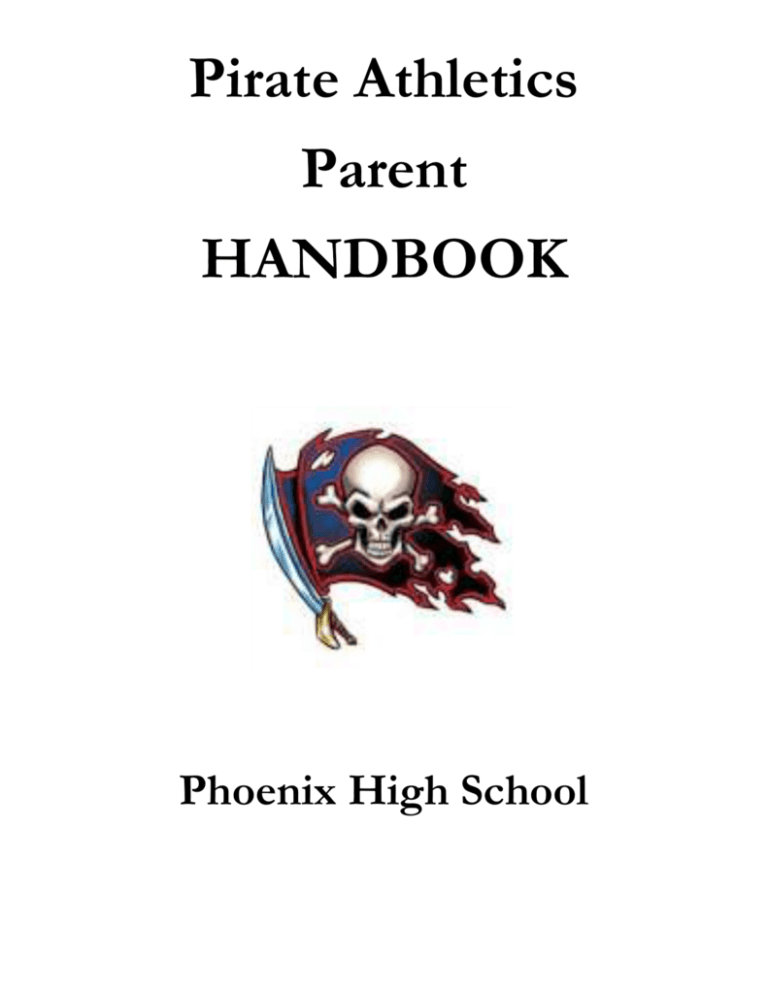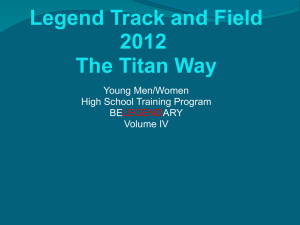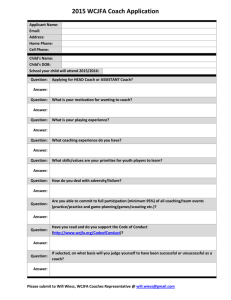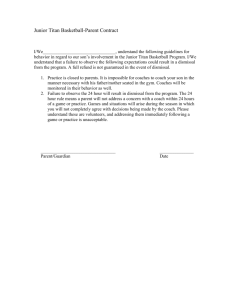Phoenix High School Athletic Department Philosophy
advertisement

Pirate Athletics Parent HANDBOOK Phoenix High School TABLE OF CONTENTS ATHLETIC DEPARTMENT PHILOSOPHY................................................................................. 1 PARTICIPATION REGULATIONS (ELIGIBILITY)…………………………………............. ………………….. 2 EXTRACURRICULAR EXPECTATIONS……………………………………………………………………………….. 3 COMMUNICATION BETWEEN PARENTS, COACHES, AND DEPARTMENT……………………….. 4 ALCOHOL, TOBACCO, AND ILLEGAL DRUGS POLICY………………………………………………………. 5 TEAM SELECTION………………………………………………………………………………………………………….. 6 PROGRAM LEVEL GOALS…………………………………………………………………............................... 7 Phoenix High School Athletic Department Philosophy The athletic program will prepare students for success by encouraging involvement, development of character and positive individual traits, and fulfillment of competitive desires. The student-athlete will learn the value of practice, fair play, conditioning, self-discipline, adherence to rules and policies, willingness to work, ability to persist even when losing, and an ability to analyze why they lost and how to compensate for it. They will learn to be humble in victory and to learn from defeat. The student will gain an appreciation for teamwork and ethical conduct while fostering a sense of belonging to the school and community. In the effort to offer a cohesive and coordinated educational program, the district insists upon ethical behavior and good citizenship of its student-athletes not only on the athletic field, but also in school, in the classroom, in the home, and amidst the community. As the needs of the student body changes in regards to athletics, the athletic program will be dynamic in its focus and consideration of new opportunities for student participation. The competition within each program provides a setting for Phoenix High School students, staff and community members to demonstrate good sportsmanship and respect for others, both in victory and defeat. Our families, school and community should be able to take pride in the players, coaches and themselves who represent Phoenix High School. Extracurricular Program Goals in General 1. The extracurricular program should realize the value of participation without overemphasizing the importance of winning or excelling. This will be particularly emphasized at the sub-varsity level(s). 2. The extracurricular program should develop and improve positive citizenship traits among the program’s participants. 3. The extracurricular program should emphasize the total educational curriculum to participants. 4. The extracurricular program should constantly strive for the development of well-rounded individuals, capable of taking their place in modern society. 5. The extracurricular program should provide genuine opportunities for students to develop positive habits and attitudes and social skills. 6. The extracurricular program should provide a superior program of student activities that includes appropriate activities for every student athlete. 1 PARTICIPATION REGULATIONS (Eligibility) Athletic Gold CARD (Clearance to Practice Form): The Athletic "Gold Card" process is established to assist the school, athlete and coach in verifying that all requirements for participation have been met prior to the athlete beginning practice. The requirements are as follows: 1) Activities and Athletics Consent and Insurance Form 2) Current Sports Physical (Every 2 Years) 3) Pay to Participate Fee Collected (or a payment plan in place) *Athletes are responsible to turn in items 1-3 to the athletic secretary. Note: No student athlete will participate without all forms completed and turned into the office for verification with the school's athletic director. A completed, stamped "Athlete Gold Card Pass” will be given to the student athlete. No student athlete will participate in practice until the "Athlete Gold Card Pass" is complete, stamped and given to the head coach. Academic Standards *This policy can be found in the PHS Student & Parent Handbook that all advisory teachers go over at the beginning of every school year. Refer to the PHS Parent/Student Handbook for complete details on minimum number of credits required to participate. PHS Athletes and Activity members (Band, Choir and Theater) will be held to an academic standard that goes beyond the minimum standards established by the OSAA. Following is the list of requirements students must adhere to in order to be eligible to participate: 2.0 GPA during each grading period or Teacher referral to the Athletic Director No F's during current playing season No Unexcused (U's) absences during the day of a contest OR the last day of school preceding a contest (ex. Friday's attendance impacts Saturday's contests). Consequence = ineligible to participate in contest No Unexcused (U's) absences during any school day. Consequence = ineligible to practice Behavior referrals may jeopardize eligibility A minimum number of credits* must be earned the year prior to participation. Additionally, OSAA standards require that a student must have passed 5 classes the previous grading period, currently enrolled in, regularly attending, and passing five classes per quarter. Students must also be making satisfactory progress toward graduation determined by a specific number of credits based on year in school. 2 PHOENIX HIGH SCHOOL EXPECTATIONS ATHLETIC DEPARTMENT 1. Provide quality coaches who understand our athletic philosophy and value all of the individuals on their teams. 2. Work cooperatively with other schools to provide appropriate competition for our athletes. 3. Be aware of, and enforce rules and regulations of the Oregon Schools Activities Association (OSAA) and the Skyline Conference. 4. Provide recognition for those who qualify for certificates, letters or awards. ATHLETE 1. 2. 3. 4. 5. 6. 7. 8. 9. Takes responsibility for clearance and eligibility. Treats coaches, officials, teammates and opponents, with respect. Puts forth his/her best effort in practices and contests. Attends all practices and contests unless clear and timely permission has been granted by the coach to be absent. Does not try to intimidate others or use “trash talk”. Remembers that it is a privilege to represent Phoenix High School in athletics. Attends and positively participates in all scheduled practices. Communicates effectively with the coach and teammates. Refrains from conversations that foster dissension. COACH 1. 2. 3. 4. 5. Treats other coaches, players, officials and parents, with respect. Follows OSAA, Skyline Conference, and Phoenix High School policies and philosophies. Prepares his/her team to the best of his/her ability. Is fair and impartial in dealing with the athletes in his/her program. Is a good role model for his/her athletes particularly in regard to self-control and makes sure that winning is considered in an educational setting. 6. Makes himself/herself available for a conference to answer questions or discuss issues. This meeting should not be immediately before or after a practice or a contest. 7. Communicate with athletic department regarding practice schedule, program policies, adds and drops to teams, and issues that come up during the season. PARENTS 1. Goes to the head coach for any purchases for son/daughter’s team. 2. Treats other parents, athletes, coaches and officials, with respect. 3. Respects the decisions and judgments of the coaches and officials even though the parents do not agree with the decisions. 4. Sets an appointment to talk with the coach about questions or issues. Does not approach the coach immediately before, during or after a practice or a contest. 5. Supports, encourages and does whatever they can to allow the athlete to attend practices fully prepared. 6. Does not put pressure on their son/daughter to win or be an All-Star. 7. Remains positive in their comments about their own athlete, other athletes, their coach and the program. 8. Reads and understands OSAA and Phoenix High School rules and regulations in this handbook. 9. Is a good role model for son/daughter by positively supporting the players, coaches and officials. 10. Leaves coaching of the team, (i.e. starting assignments, positions, playing time and level of play such as freshman, J.V. or Varsity) to the coaching staff. 3 COMMUNICATION Communication you should expect from your athlete’s coach 1. Coaching philosophy and criteria for earning a varsity letter. 2. Expectations regarding such things as attendance at practice, attitude, effort, academics, requirements for a letter or participation certificate, special equipment need. 3. Location and times of practices and contests. 4. Team activities, i.e. off-season conditioning and camps, meetings, etc. 5. Process for determining starting lineup, playing time and cuts, if applicable. 6. Responsibility for gear issued. 7. Rules and regulations and consequences for breaking rules. Communication coach expects from parents 1. Concerns expressed directly to the coach FIRST. 2. Notification of any schedule conflicts well in advance (i.e. vacations and trips). 3. Specific concern in regard to a coach’s philosophy and/or expectations. Appropriate concerns to discuss with coaches 1. The treatment of your child, mentally and physically. 2. Ways to help your child improve. 3. Concerns about your child’s behavior. Issues not appropriate to discuss with coaches 1. 2. 3. 4. Playing time (player and coach discuss). Team strategy Play calling. Matters pertaining to other athletes. Procedures to be followed regarding concerns parents or athletes have with the coach 1. Call the coach or speak to them about setting up an appointment. 2. If the coach cannot be reached, call the Athletic Office (535-1526) to have a date set up with the coach. 3. Please DO NOT attempt to confront to coach before or after a practice or game. THE NEXT STEP What can a parent do if the meeting with the coach did not provide a satisfactory resolution? 1. Call and set up an appointment with the Athletic Director to discuss the situation. 4 Alcohol, Tobacco and other Illegal Drugs Policy Students involved in extracurricular athletics and activities shall not knowingly be present at any site where illegal activities such as the sale, use and consumption of illegal substances and/or alcohol by minors is occurring. A student athlete must leave immediately and cannot linger. If normal investigative procedures conducted by school administration determine non-compliance the policies as outlined in the student handbook will be followed. First Offense: Level One a. Student will be suspended immediately from competition/performance for two (2) weeks from the date school officials verify the incident. This must include missing at least one contest/performance. b. The student will be able to practice during the suspension Second Offense: Level Two a. If a second violation occurs at any time during the student’s high school career, the student will be immediately suspended from competition/performance for four (4) weeks from the date school officials verify the second incident. b. Students shall be excluded from participating in the next performance/competition regardless of whether the performance/competition occurs within the stipulated four (4) week time period. c. The student will be able to practice during the suspension Third Offense: Level Three a. If a third violation occurs at any time during the student’s high school career, the student will be immediately suspended from competition/performance for nine (9) weeks from the date school officials verify the third incident. b. Students shall be excluded from participating in the next performance/competition regardless of whether the performance/competition occurs within the stipulated nine (9) week time period. c. The student will be able to practice during the suspension Fourth Offense: Level Four a. If a fourth violation occurs at any time during the student’s high school career, the student will be removed immediately from that activity/season of competition and be ineligible to participate in any extracurricular activities/seasons of competition for one (1) calendar year. b. The student will not be able to practice during the suspension. Fifth Offense: Level Five If a fifth violation occurs at any time during the student’s high school career, the student will be removed immediately from that activity/season of competition and ineligible to participate in any extracurricular activities/seasons of competition for the remainder of his/her career at Phoenix High School. 5 TEAM SELECTION Philosophy In accordance with our philosophy of athletics and our desire to see as many students as possible participate in the athletic program while at Phoenix High School, we encourage coaches to keep as many students as they can without unbalancing the integrity of their sport. Time, space, facilities, equipment, personal preference, and other factors will place limitations on the most effective squad size for any particular sport. However, when developing policy with respect to team selection, please strive to maximize the opportunities for our students without diluting the quality of the program. Cutting Policies 1) Responsibility a) Choosing the members of each athletic team is the sole responsibility of the coaches. b) Non-varsity coaches shall take into consideration the policies established by the head coach in that particular program when selecting final team rosters. c) Prior to team selection, the coach shall provide the following information to all candidates for the team: 2) (1) Extent of try-out period (2) Criteria used to select the team (3) Number to be selected (4) Practice commitment if they make the team (5) Game commitments Procedure When a team selection becomes a necessity, the process will include five (5) important elements. 1) Each candidate shall have competed in a minimum of three (3) practice sessions 2) Cut lists are not to be posted. 3) Coaches will discuss alternative possibilities for participation in the sport, or other areas of the activities program. 4) If a coach anticipates a cut will be made, he/she must discuss the situation with the Athletic Director in advance of any announcement being made to students or parents. 5) Coaches must provide documentation as to why the player did not make the team. The documentation needs to contain some objective measure/s used in the process. 6 Program Level Goals Varsity Athletics One of the main goals of varsity athletics is to put our most committed responsible and talented athletes of the team in competition to win the contest. Starting positions and playing time are not guaranteed to seniors making a team or anyone else. Student athletes at any grade level possessing the necessary skills and commitment have the same opportunity to make any level of team. Playing time and starting positions will be determined by an evaluation used by the head coach. The criteria for determining playing time and starting positions will be made clear at the beginning of the season. When asked, coaches will communicate with student athletes on an individual bases about what the player needs to do to receive more competition time. Junior Varsity Athletics At the junior varsity level players will be developing skills and experiences that will facilitate them in being a successful varsity player when the time arrives. The focus at this level is being competitive while providing all deserving team members a chance to participate in competitions. Junior varsity coaches will also utilize a system to determine starting positions as well as amount of time played in the competitive competition. The focus at this level is less on winning and more on athlete development. Scheme, fundamentals, and terminology used will be established by the head varsity coach. The junior varsity and varsity coach must work together to ensure athletes will be ready for the higher competition at the varsity level. Ultimately the junior varsity program is an extension of the varsity program. 7





